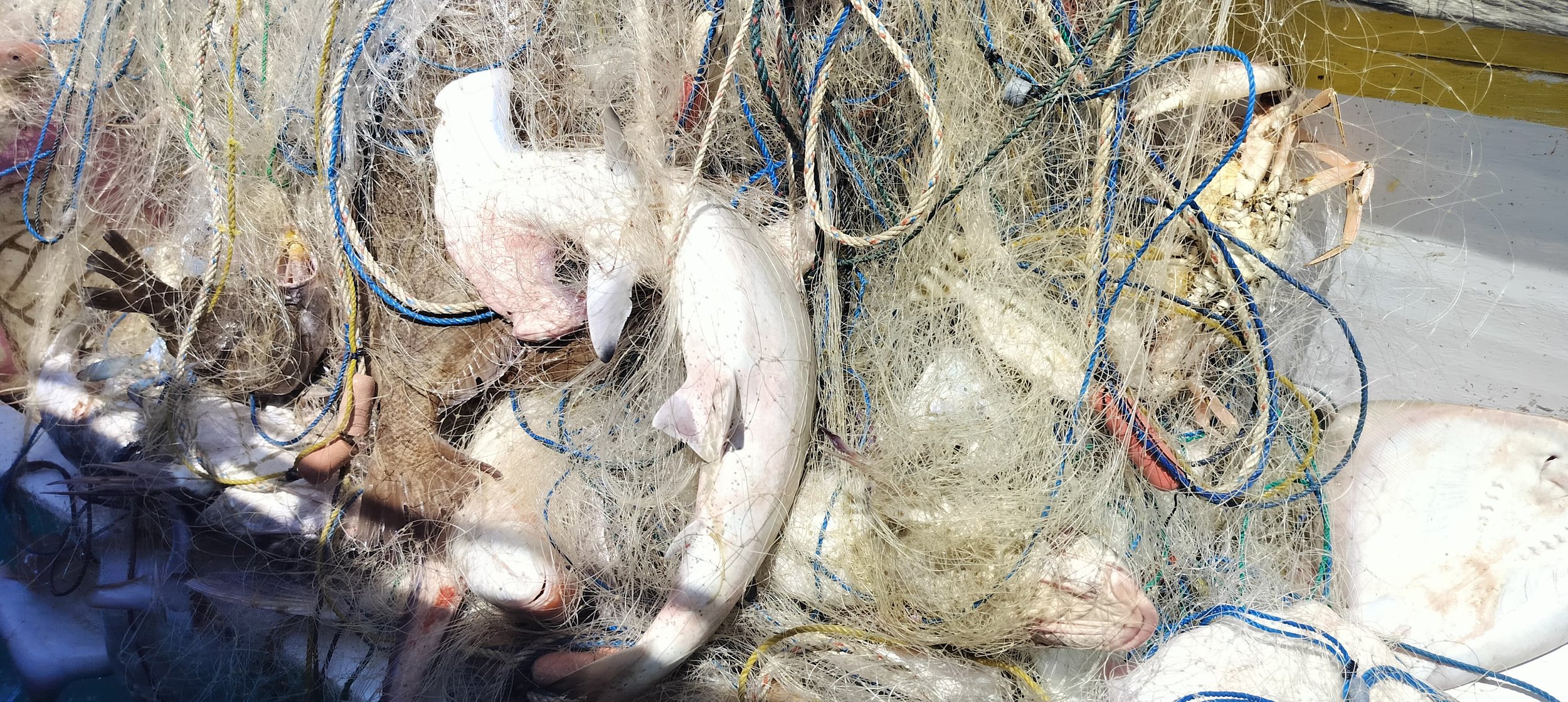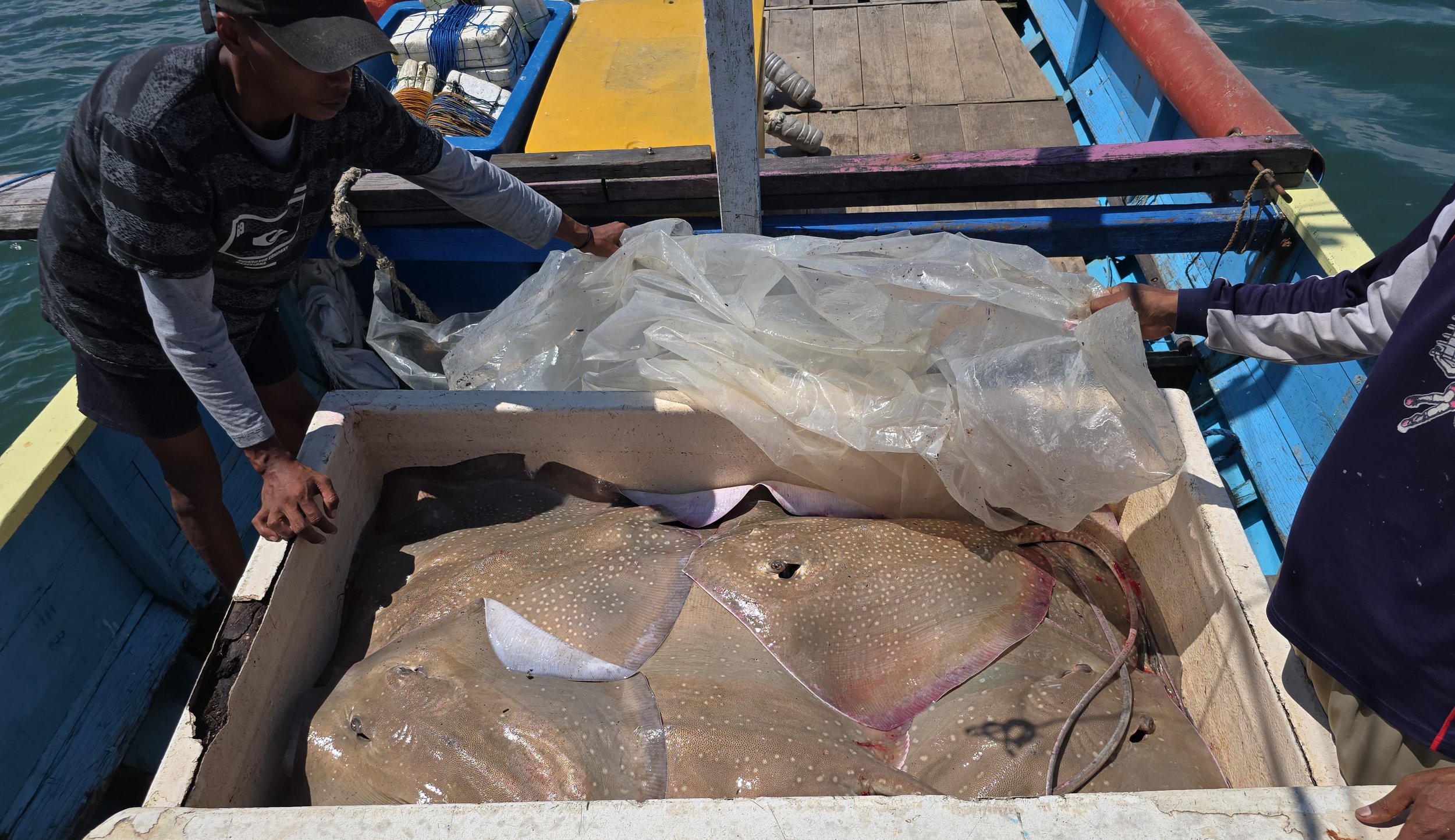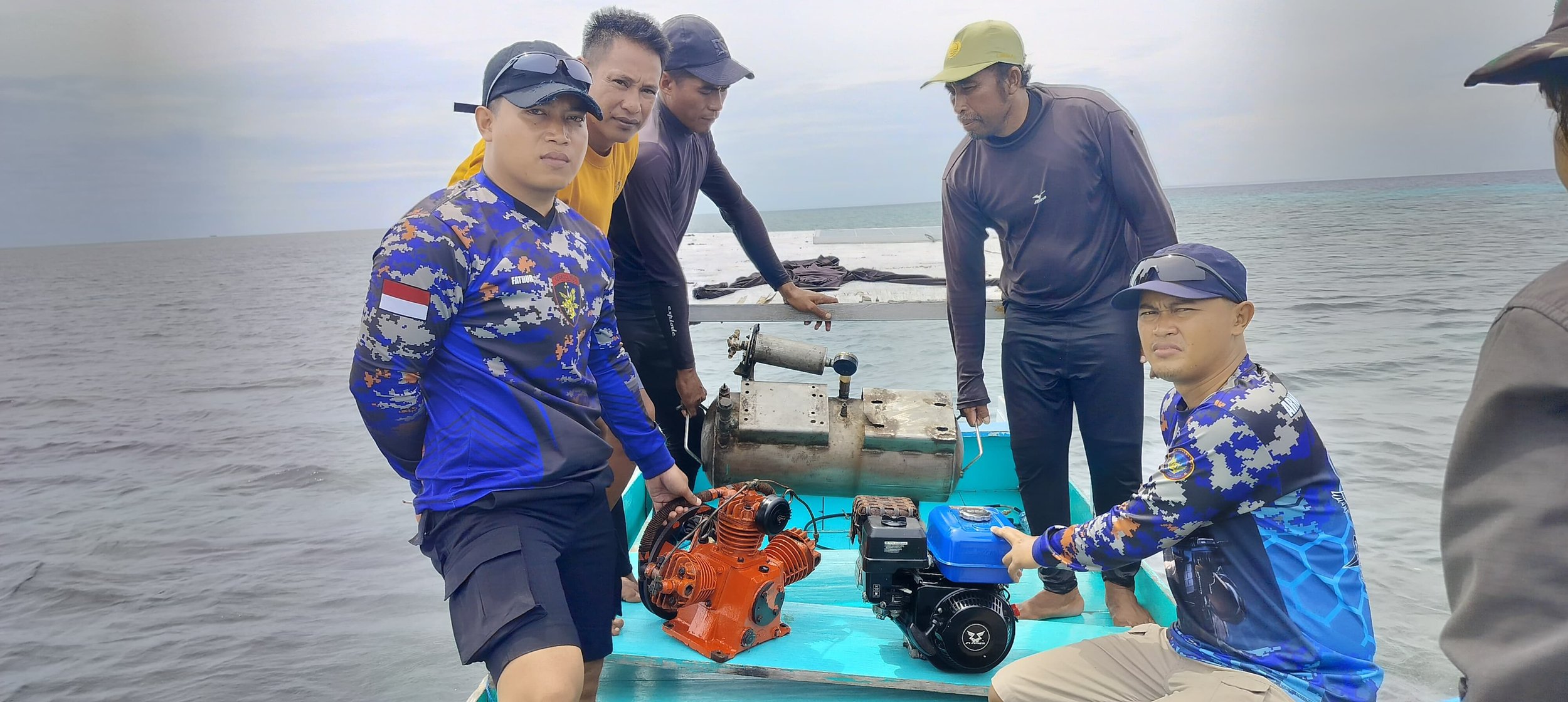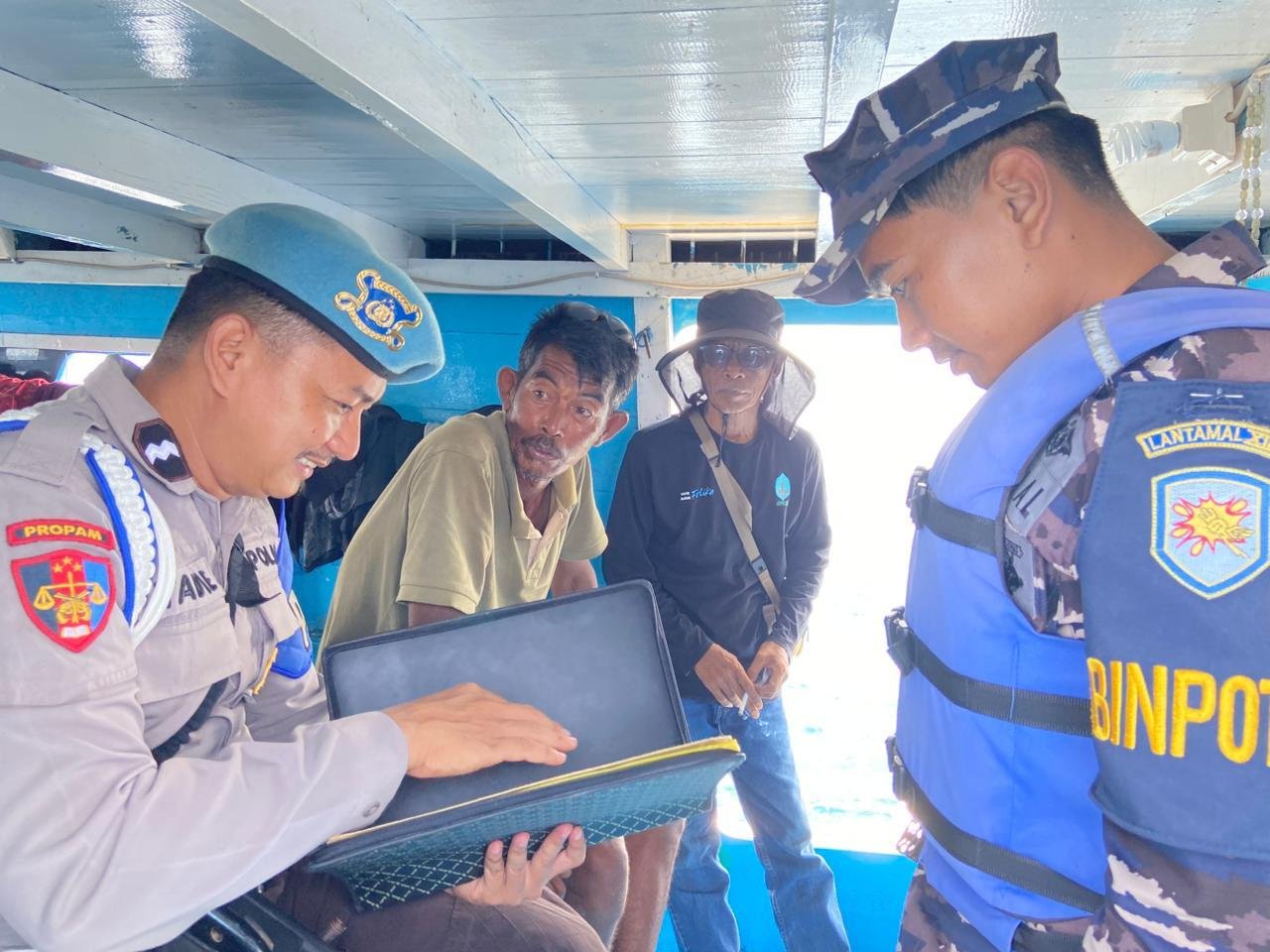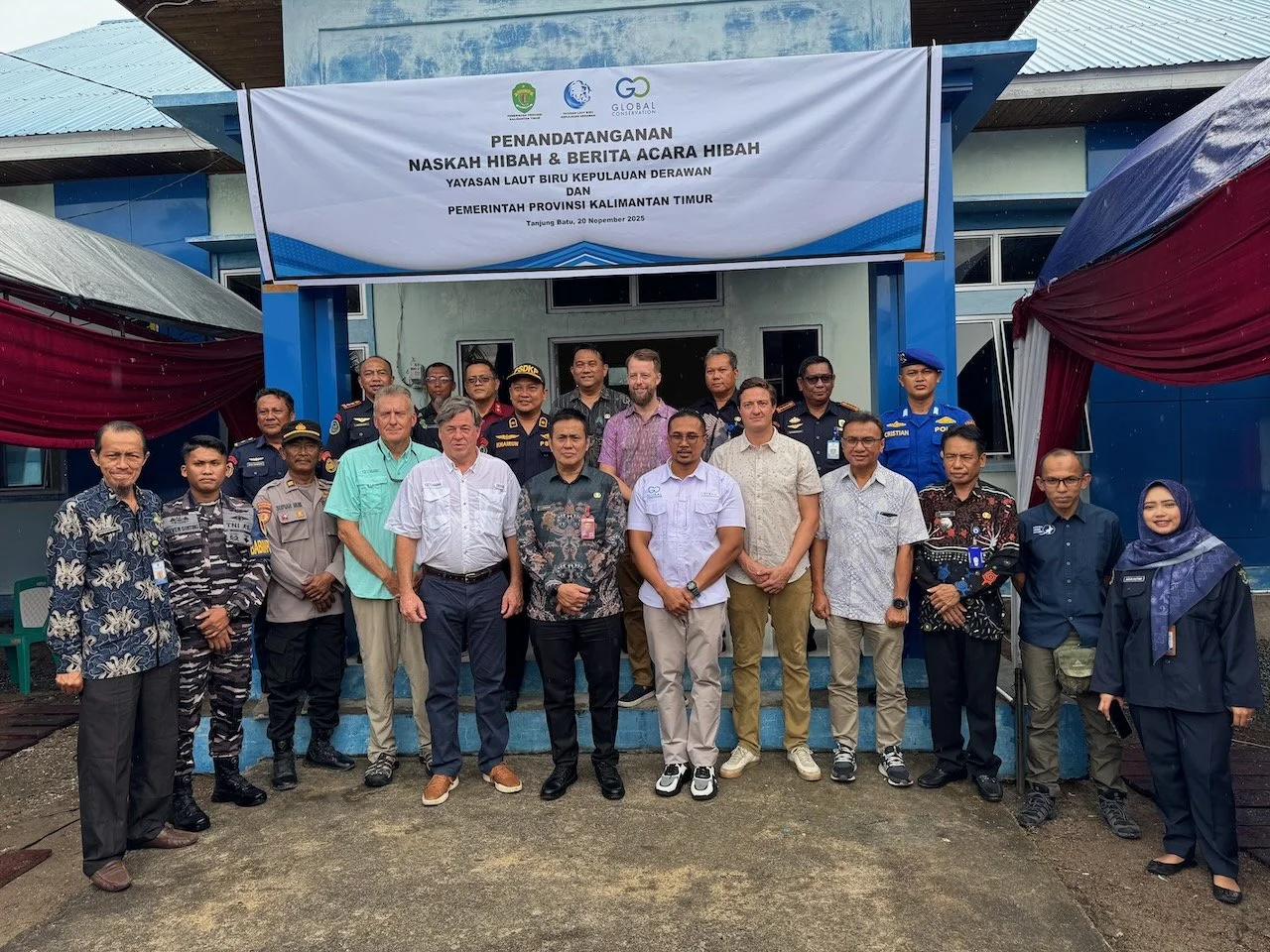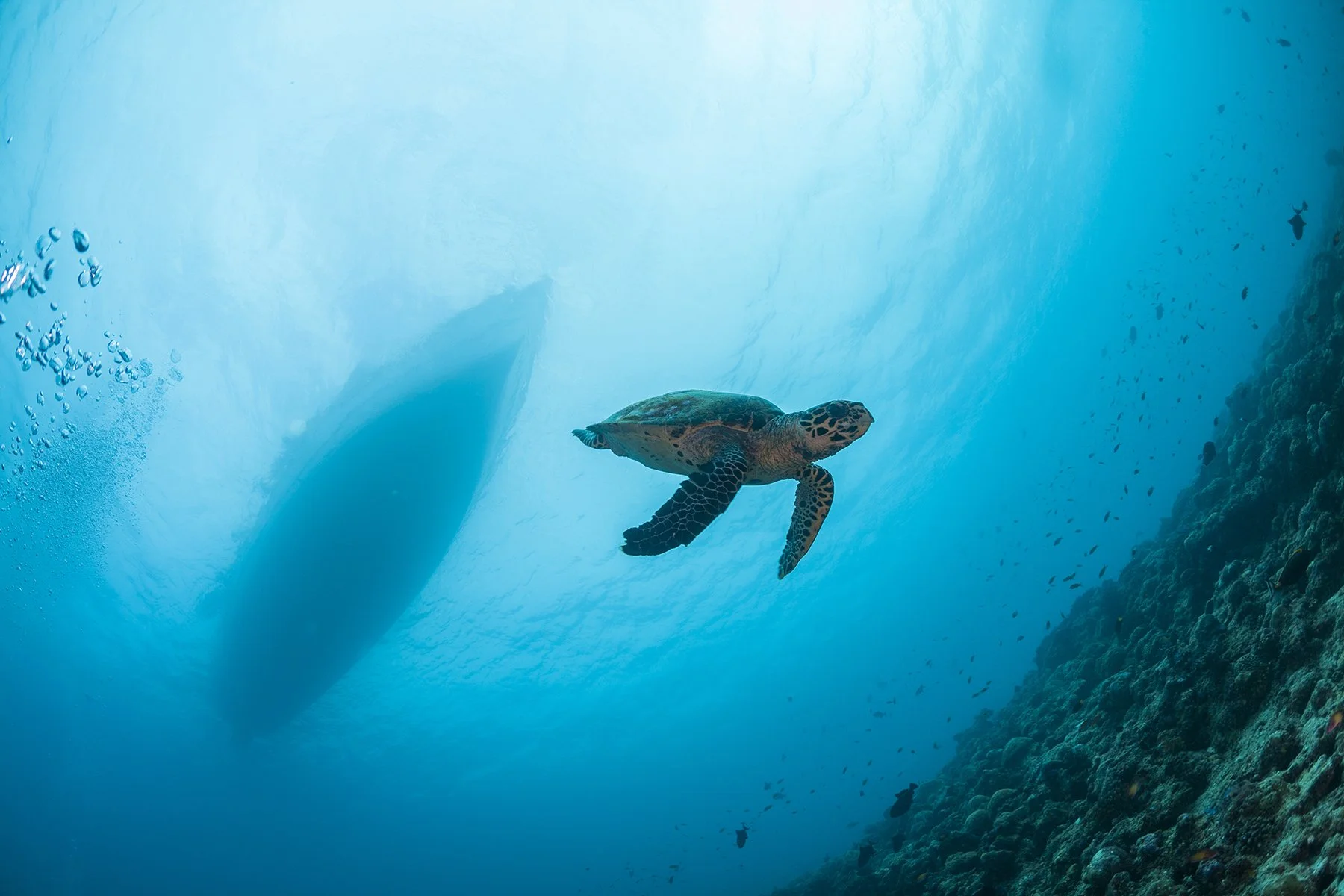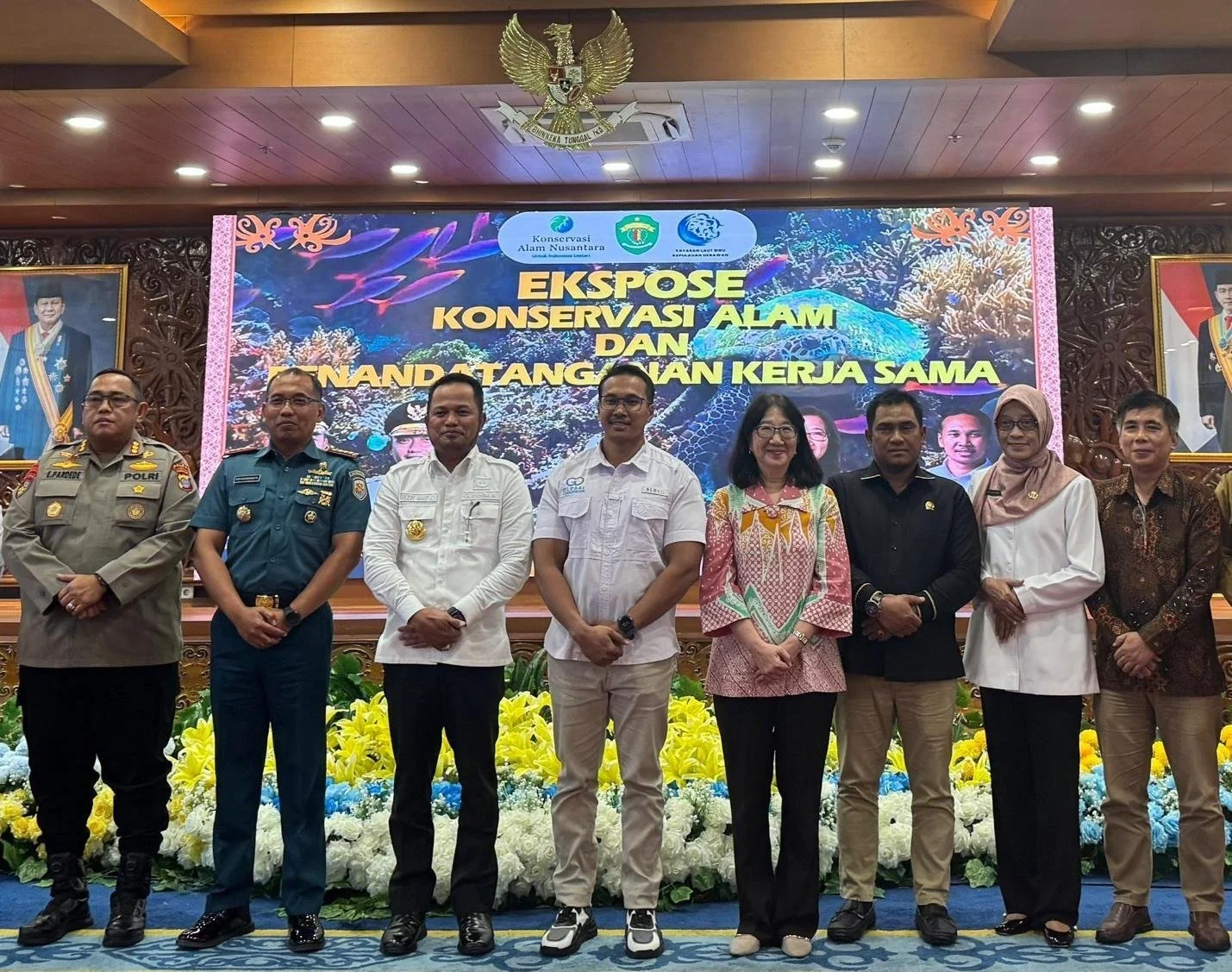The First Annual GC Report for the Derawan Archipelago
Derawan Island is part of the Derawan Archipelago and resides in the heart of the "Coral Triangle."
The Derawan Archipelago, a collection of tropical islands with vibrant coral reefs, boasts a stunning underwater landscape. It ranks among the most biologically diverse regions in Indonesia and serves as a critical protein source for communities across the Sulawesi Sea, including Indonesia, Malaysia, and the Philippines.
Despite its natural beauty and ecological importance, the Derawan Archipelago faces significant challenges in both the fishing and tourism sectors.
In the fishing industry, some local and non-local fishermen continue to use destructive methods, inflicting severe damage on the environment and jeopardizing resources for future generations.
In the tourism sector, poor coastal and spatial planning has led to severe erosion on Derawan Island, one of the archipelago’s most popular destinations. This erosion has drastically reduced vital breeding sites for green and hawksbill turtles, threatening their populations.
To address these issues, GC launched its mission in Indonesia, appointing the Derawan Archipelago as its third project across the country. In Derawan, GC aims to preserve and protect the local environment, ensuring its sustainability for generations to come.
Since formally beginning its third mission in Indonesia in January 2024, Global Conservation of Derawan Archipelago, later called “GC Derawan,” has established a dedicated team of four personnel:
Dadang Mujiono, Project Director
Zenobia Helza, Project Coordinator of Derawan Island
Entersten Sitepu, Project Coordinator of Maratua Island
Nurul Aspiyanti, Finance Manager
GC’s initiatives in the Derawan Archipelago are organized into three core clusters: Global Park Defense, Community Protection, and Blue Campaign. These programs work in tandem to safeguard the region’s biodiversity while promoting sustainable fishing and tourism practices.
GLOBAL PARK DEFENSE
Regular and targeted patrol
To implement Global Park Defense, later called GPD, GC Derawan began its efforts by organizing Spatial and Monitoring Reporting Tools (SMART) training in Tanjung Redeb, the capital city of Berau. This training brought together local and provincial stakeholders to enhance their capacity for conservation and protection initiatives.
Held at Palmy Hotel, the training welcomed a diverse group of participants, including:
1. Fisheries supervisors from the Berau Regency Fisheries Service,
2. Ocean rangers from the East Kalimantan Environmental Conservation Agency,
3. Officials from the Derawan Island Village Government,
4. Officials from the Maratua Island Village Government,
5. Ocean rangers from the Tourism Awareness Group of Sumping Nusa,
6. Ocean rangers from the Maratua Institute for Environmental Care,
7. Turtle rangers from the Maratua Institute for Turtle Protection (MALIPE), and
8. Officers from the Derawan Island Navy post station.
This collaborative effort aims to strengthen the region's conservation strategies, ensuring a united approach to safeguarding the unique biodiversity of the Derawan Archipelago.
Group picture in the SMART’s training opening ceremony (From left to right at front: Chief of the Air and Water Police of Berau Resort, Chief of the NAVY of Berau Resort, the Mayor of Berau, Project Director of GC Derawan, Head of Fisheries Dept of Berau Gov) .
In the following month after the SMART training, GC Derawan facilitated the establishment of the new Berau MPA Task Force. A new task force dedicated to protecting the Berau MPA, led by the Fisheries Dept of Berau Gov, in collaboration with the Fisheries and Marine Affairs of EK Provincial Gov, the Air and Water Police of EK and Berau, the Navy under the coordination of Naval Base Headquarters XIII, the EK Environmental Conservation Agency, the Army, and the Maratua Institute for Turtle Protection.
Joint assembly of provincial and district fisheries supervisors before conducting targeted and regular patrols in the waters of Balembangan Island.
As the new task force was established, GC Derawan procured patrol gear and funded targeted and regular patrols up to three times per month. The first procurement was donated to the Fisheries Dept of Berau Gov. This includes two Yamaha outdoor machines with 85 horsepower units, cables, hydraulics, laptops, smartphones, drones, and GPS. The following procurement was donated to GC field partners, who collaborated with the Fisheries Dept of Berau Gov in conducting regular and targeted patrols. Items procured for GC’s field partners were similar to those in the previous procurement.
Boat engines procured by GC Derawan to support patrol operations by the Berau MPA Task Force.
With the newly formed Berau MPA Task Force—in collaboration with a multi-stakeholder collaboration—equipped with state-of-the-art patrol equipment and funding from the GC, the team could finally resume patrols that had been stalled for seven years. Since its formation in early 2024, this patrol team has successfully conducted law enforcement in the Berau’s MPA, particularly in the Derawan Archipelago.
From January 2024 to November 2024, the newly integrated patrol team has conducted regular and targeted patrols across the entire Berau Marine Protected Area (MPA), which spans 285,548.95 hectares. These efforts reflect a commitment to safeguarding one of Indonesia's most critical marine ecosystems. The typical patrol routes, illustrated in the following figures (Pictures 4-6), provide a clear depiction of the coverage and operational zones within the MPA. The patrol team strategically divides the area into three sectors, South, East, and North, allowing for focused and effective surveillance tailored to the unique challenges of each region.
Top images in order: South Route, East Route, North Route
From January to November 2024, the patrol team covered an impressive 6500.99 km (approximately 3510.26 nautical miles) over nearly 75 days. On average, the team conducted 2 to 3 patrols per month, ensuring consistent monitoring throughout the year. Patrol operations typically ran from morning to evening, targeting key threats such as illegal fishing, fish bombing, and poaching of endangered marine species. By integrating advanced planning, operational execution, and strategic route division, the team has significantly enhanced the protection of Berau's MPA, fostering a safer and more sustainable marine environment.
From the past patrols, the patrol team managed to find various illegal fishing activities that occurred in the Berau’s MPA, particularly in the waters of the Derawan Archipelago. These are:
1) On December 14, 2023, the patrol team arrested two suspects for attempting to sell 2,200 stolen turtle eggs from Bilang Bilangan Island, Berau. The suspects were caught with eggs stored in Styrofoam boxes and fish crates using a wooden boat. They face charges under Indonesia's conservation laws, emphasizing efforts to protect marine ecosystems.
Patrol teams with the bomb users in the local police station.
2) On February 22, 2024, the patrol team apprehended individuals engaged in illegal fishing activities in the Berau’s MPA. The team found the bomb user near the Dangalahan Reefs, five hours from Maratua Island. Upon inspection, they discovered evidence of fish bombing, including detonators, fish caught using explosives, and a compressor.
3) On March 13, 2024, the patrol team intercepted a shipment of 100 kilograms of shark fins destined for Surabaya. The fins, sourced from endangered sharks, were harvested illegally in the waters of Muaras Reefs, an hour from Maratua Island. While the poachers were issued citations, the evidence was confiscated.
4) On April 23, 2024, the Berau MPA Task Force issued citations to fishers caught harvesting endangered sharks, including hammerhead sharks (hiu martil), in the Muaras Reefs near Maratua Island. This area, already under scrutiny following a similar incident in March, remains a hotspot for illegal shark harvesting.
A dead green turtle due to fish bombing found during regular patrol by the Berau MPA Task Force.
5) Between May 27 and 29, 2024, the Berau MPA Task Force discovered several turtles killed by fish bombing in the waters of Panjang Island, near Derawan Island. This destructive fishing practice threatens marine biodiversity and violates conservation laws protecting endangered species like sea turtles. The incident underscores the persistent challenge of illegal fishing in the region and the urgent need for stricter enforcement and community education to protect the fragile ecosystem of the Derawan Archipelago.
6) In July 2024, the patrol team seized eight vessels involved in illegal fishing activities across the waters of Berau’s MPA. These operations targeted vessels using prohibited fishing gear, such as trawls, and those operating without proper licensing.
7) In the second week of September 2024, the patrol team confiscated suspicious fishing gear from fishers from Biduk-Biduk Coast. The equipment, believed to be intended for fish bombing, is now under police custody. The individuals were issued citations and stern warnings against engaging in illegal fishing practices.
8) Between November 9 and 11, 2024, the patrol team apprehended two fishing vessels from Tarakan operating within four nautical miles of Berau's coastline without proper authorization. Authorities confiscated six sets of longline fishing gear and 6,000 hooks, now secured at the Sambaliung Fish Auction Facility.
9) In November 2024, the patrol team intercepted shark poaching in the waters of Muaras Reefs. Following standard procedures, the captured sharks were released back into the sea. The poachers received strict warnings and citations from the authorities and were expelled from the Muaras Reefs’ waters.
This is the effect blastfishing has on marine ecosystems filled with coral.
10) In a pivotal case, the Tanjung Redeb District Court sentenced Sardin, a 39-year-old fisherman from Batu Putih, to two years in prison and fined Rp10 million for fish bombing in Maratua waters.
Arrested on February 22, 2024, during a joint patrol by the Maratua Naval Post, Maratua Police, and the Maratua Institute for Turtle Protection, Sardin was found guilty of using explosives to fish, a practice harmful to marine ecosystems. The court ruling emphasizes strict enforcement against illegal fishing and aims to deter similar activities, marking significant progress in preserving the Derawan Archipelago's marine biodiversity.
Green turtle at Maratua Island. Photo ©shutterstock.com
Turtle Protection
The Derawan Archipelago is home to one of Southeast Asia’s largest green turtle sanctuaries, with significant nesting sites located on Sangalaki and Balembangan Islands. Recognizing the critical importance of protecting these endangered species, GC Derawan is deeply committed to supporting turtle conservation efforts throughout the archipelago. Many local turtle protection organizations, however, operate with minimal or no funding and lack adequate surveillance equipment, making GC Derawan's involvement essential.
Across the archipelago, turtles face numerous threats, including egg smuggling, poaching, and destructive fishing practices such as bombing. Egg smuggling is particularly rampant, with East Kalimantan—especially its capital, Samarinda—serving as a hub for the illegal turtle egg trade. Locals widely regard turtle eggs as a delicacy, despite legal prohibitions on their sale and the potential diseases they may cause after consumption. Local myths perpetuate the belief that consuming turtle eggs enhances sexual performance or cures chronic illnesses like asthma and circulatory problems.
Unfortunately, limited resources have hindered the ability of local organizations to combat these issues effectively. In some cases, even turtle rangers have been tempted into smuggling due to the financial allure of the illegal trade.
An Aerial view of Balembangan Island.
GC's Commitment to Change
In light of these challenges, GC Derawan is dedicated to gradually addressing these threats by collaborating with local organizations engaged in turtle protection. Our first collaboration, launched in early 2024, is with the Maratua Institute for Turtle Protection (MALIPE). MALIPE is based on Balembangan Island, located in the Muaras Reefs in the eastern Derawan Archipelago.
Incentives and Ranger Welfare
GC Derawan firmly believes that ranger welfare is key to maintaining integrity and commitment to conservation. In addition to providing monthly salaries above the minimum wage, GC Derawan offers performance-based bonuses. Rangers who apprehend perpetrators of turtle egg trafficking or other illegal activities receive incentives as recognition of their efforts. We also provide holiday allowances to further support the well-being of rangers. These measures foster a motivated, honest, and dedicated team committed to the highest standards of conservation.
Through these initiatives, GC aims to create a sustainable framework for turtle protection while addressing the root causes of conservation challenges. By empowering local organizations like MALIPE and prioritizing ranger welfare, GC is taking decisive steps to safeguard the future of green turtles in the Derawan Archipelago.
The MALIPE Turtle Rangers.
Commitment to Provide a Suitable Habitat for Turtles
Maintaining a clean and safe habitat is essential for the survival and reproduction of green turtles. Turtle rangers on Balembangan Island regularly clean the beaches to remove driftwood and debris brought ashore by sea waves. If left unattended, these obstructions can significantly disrupt the turtles' nesting cycles. Turtles avoid laying their eggs on beaches obstructed by rubbish and driftwood, as they require clear pathways to reach suitable nesting sites. Moreover, hatchlings emerging from their eggs face considerable challenges when their route to the sea is blocked by debris.
By prioritizing regular beach cleaning, rangers ensure that turtles can safely nest and that hatchlings can return to the sea without unnecessary hindrances. This proactive approach is critical for supporting the natural lifecycle of turtles on Balembangan Island.
Turtle rangers educate students about turtles and their habitat in the city of Samarinda.
Turtle Education
To cultivate awareness of turtles, their habitat, and a sense of responsibility toward them, MALIPE, supported by GC Derawan, conducts educational outreach programs in schools across Samarinda and Berau, targeting from elementary to senior high school. Through engaging presentations, visual aids, and interactive activities, students gain a comprehensive understanding of turtles' ecological importance, the threats they face, and actionable ways to protect them.
The programs address key challenges, including the widespread consumption and trade of turtle eggs, which are deeply rooted in local culture. By debunking myths about the supposed health benefits of turtle eggs and highlighting the legal and environmental consequences of unsustainable practices, these sessions seek to reshape community perceptions and behaviors.
Educational efforts are tailored to resonate with local communities in Samarinda, a significant hub for the illegal turtle egg trade, and in Berau, which is home to vital turtle nesting sites. By targeting schools in these regions, MALIPE aims to create a ripple effect, where students influence their families and communities to adopt conservation-minded practices. This dual-region approach ensures that urban and coastal communities are empowered to actively preserve the Derawan Archipelago’s rich marine biodiversity.
An aerial view of Sangalaki Island.
Sangalaki Island: A New Focus for Conservation
Sangalaki Island has become a key focus of GC Derawan’s efforts to preserve marine and terrestrial ecosystems, as it is located within the Derawan Archipelago and serves as Southeast Asia's biggest green turtle sanctuary. As a critical habitat for endangered green and hawksbill turtles, the island faces numerous threats, particularly egg poaching. Recognizing the island's significance within the broader ecosystem, GC Derawan has launched an expansion program integrating modern technology, community education, and sustainable management practices.
This initiative aims not only to protect species and habitats but also to engage local communities in conservation efforts. By fostering collaboration between government agencies (such as the EK Environmental Conservation Agency/BKSDA) and local communities, Sangalaki Island is envisioned as a model for sustainable conservation.
A Mobile Marine Monitor in California’s Channel Islands. Credit: Protected Seas
Future Plans
To strengthen turtle protection and ensure the sustainability of conservation efforts on Sangalaki Island, several strategic steps are planned:
1. Surveillance enhancement: Installation of CCTV cameras at eight strategic locations will enable round-the-clock monitoring of illegal activities, ensuring the island's protection 24/7.
2. Infrastructure development: Providing clean water access will meet the needs of field personnel and visitors without disrupting the island’s natural ecosystem.
3. Human resource investment: Additional rangers, particularly from Community Forest Ranger Partners (MMP), will be recruited to enhance patrol intensity and community outreach programs. Improved logistics and training will support their efforts in maintaining the island’s biodiversity.
4. Maritime patrol support: The procurement of motorized boats will facilitate sea patrols, focusing on monitoring turtle migration routes and addressing potential threats in surrounding waters.
5. Advanced monitoring: The planned deployment of the M2 radar system will provide comprehensive monitoring of vessel movements near the conservation area, improving maritime security and reducing illegal activities.
The Minister of Tourism and the Creative Economy/Head of the Tourism and Creative Economy Agency Sandiaga Salahuddin Uno expressed his appreciation to the Tourism Awareness Group (Pokdarwis) in the Tourism Village of Derawan Island, Berau Regency, East Kalimantan, for their commitment to developing tourism while maintaining environmental preservation and sustainability in the Derawan Island area.
COMMUNITY PROTECTION
Addressing the Root Causes of Illegal Activities
GC Derawan has played a pivotal role in helping local communities transition from illicit fishing practices to sustainable and environmentally friendly methods. This initiative includes providing financial support and eco-friendly fishing gear to promote sustainable livelihoods while protecting marine ecosystems.
Handover of bubu material purchase assistance to Derawan Island fishers
Transforming Practices on Derawan Island
On Derawan Island, GC Derawan specifically targeted the local fishers group, assisting them in adopting sustainable fishing methods. A key focus has been the procurement of environmental fishing gear materials to make bubu. Bubu is a local-based fishing gear designed to catch fish without harming marine ecosystems. The bubu is crafted from durable and environmentally friendly materials, such as a combination of rattan and wire.
GC Derawan provides Maratua Island fishers with environmental fishing gear.
Supporting sustainable Fishing on Maratua Island
In Maratua, GC has distributed eco-friendly fishing gear to help local fishers transition to legal, sustainable practices. The support package includes fishing lines, hooks, lead sinkers, and 50-liter fish storage boxes, enabling the fishers to maintain productivity while minimizing environmental impact.
This support has been well-received by the community, with many fishers already seeing positive results. By adopting these tools, they are moving away from destructive fishing methods and embracing practices that ensure the sustainability of marine resources. This transformation not only sustains their livelihoods but also contributes to the long-term health of the marine ecosystem, upon which their survival depends.
Impact
Through these efforts, GC is addressing the root causes of illegal fishing activities by providing viable alternatives that empower local fishers. These programs not only help preserve the natural beauty and biodiversity of the Derawan Archipelago but also inspire other coastal communities to adopt similar sustainable practices. By fostering stewardship and sustainable resource use, GC is paving the way for a future where communities and marine ecosystems thrive together.
Whale sharks are gentle giants located in the waters of Derawan. Their presence alone has created a tourist attraction for eager visitors who want to experience close encounters with these unique beings. Photo ©shutterstock.com
BLUE CAMPAIGN
Blue Campaign initiatives in the Derawan Archipelago
GC Derawan actively promotes environmental stewardship through its Blue Campaign, focusing on both Derawan and Maratua Islands. These initiatives involve collaborations with local communities, organizations, and environmental groups to raise awareness and take actionable steps toward preserving the natural beauty and biodiversity of the archipelago.
A. Blue Campaign activities on Maratua Island
GC Derawan has launched a series of environmental initiatives on Maratua Island, emphasizing community involvement and education:
Ocean rangers of the Maratua Institute for Environmental Care clean the Batu Payung Maratua beach.
Beach clean-ups at Batu Payung village
Collaborating with Maratua Peduli Lingkungan (the Maratua Institute for Environmental Care), GC Derawan organized a clean-up activity at Batu Payung Beach. Volunteers worked together to remove waste, enhancing the beach's aesthetic appeal and protecting marine life from pollution.
The mother/ladies (Emak-emak) participate in beach clean-ups in Teluk Harapan village
Beach Clean-up in Teluk Harapan village
Partnering with residents of Village Teluk Harapan, GC Derawan conducted another clean-up activity focused on maintaining the health and cleanliness of this vital coastal area. This effort strengthened the community’s role in environmental conservation.
In collaboration with Kalasahan Foundation, GC Derawan hosts educational campaign to young children to save the environment on Maratua Island.
Environmental education for children in Teluk Harapan village
GC Derawan organized educational sessions for local children, teaching them the importance of environmental protection. These interactive activities instilled a sense of responsibility and pride in preserving their island’s natural resources for future generations.
Animal protection campaign in the World Walking Day (WWD) in Balikpapan
As part of GC Derawan’s commitment to saving animals from extinction and protecting the Derawan Archipelago from illegals, during the WWD in Balikpapan, GC Derawan, in collaboration with the Blue Economy Team of East Kalimantan, conducted an animal protection campaign and promoted GC Derawan’s project in the Derawan Archipelago. This activity was crucial for GC Derawan, as Balikpapan is the main gate of East Kalimantan, and many tourists, both local and international, who visit the Derawan Archipelago originate from Balikpapan.
Underwater cleaning by Maratua Pro Dive Master Community.
Coral Cleaning with Maratua Pro-Dive Master
GC Derawan joined forces with the Maratua Pro-Dive Master to carry out coral-cleaning activities in the waters of Maratua. By removing harmful debris from coral reefs, the initiative helps maintain the health of these vital marine ecosystems, which serve as critical habitats for diverse marine life.
B. Blue Campaign Activities on Derawan Island
On Derawan Island, GC has partnered with local stakeholders to implement impactful conservation measures:
Beach clean-ups on Derawan Island
Collaborating with the Tourism Awareness Group of Sumping Nusa, GC Derawan facilitated a beach clean-up to address pollution and improve the coastal environment. This effort highlights the importance of community-driven action in maintaining the island's pristine beauty.
Coral Planting and Underwater Cleaning
Working with Coral Planters, GC Derawan supports the organization in planting and cleaning corals. These activities aim to restore damaged coral reefs, enhance biodiversity, and ensure thriving habitats for marine species. The underwater cleaning also removes debris that could otherwise harm marine life.
Impact of the Blue Campaign
The blue campaign underscores the importance of community collaboration in conservation efforts. By engaging with local groups and individuals, GC Derawan not only improves the immediate environment but also fosters a culture of environmental responsibility. These initiatives demonstrate how small, community-focused actions can lead to significant, long-term benefits for the Derawan Archipelago.













